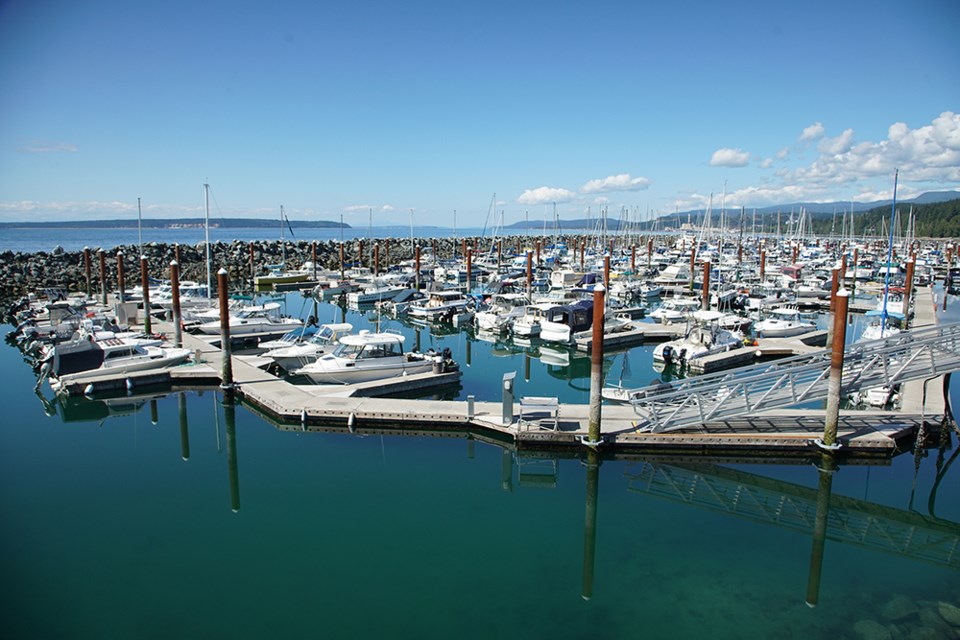City of Powell River councillors heard a series of harbour recommendations, which included bringing north harbour moorage rates more in line with coastal averages.
At the June 23 finance committee meeting, chief financial officer Mallory Denniston outlined a proposed new north harbour rates and regulations bylaw. She said the current bylaw was adopted on December 16, 2021.
“Council adopted that bylaw currently in place but requested further information and further improvements be proposed in 2022 to take effect on January 1, 2023,” said Denniston. “Finance and operations have collaborated to propose bylaw 2702, which incorporates the changes.”
Denniston said beginning on January 1, 2023, under the proposed bylaw, there would be a requirement for moorage contract holders to hold $1 million in marine liability insurance. Another revision is adding clarity to the bylaw around the transferring of rights to protect contracts connected to the vessel owner from being transferred with the vessel in case of sale.
Denniston said the third change to the bylaw is a four-year rate schedule, supported by thorough research and analysis, along with a possible tiered rate system for residents of the city, qathet Regional District (10 per cent higher) and all other areas (15 per cent higher).
The analysis supported 15 per cent increases in the annual mooring rate in 2023, 2024 and 2025, and two per cent thereafter, according to Denniston.
“This would be to catch up to average and be within the range of Discovery Harbour in Campbell River, which was identified as our main comparable,” she said.
Liability insurance
Regarding marine liability insurance, Denniston said the current bylaw does not have a requirement for moorage contract holders to carry marine liability insurance, which could result in consequences to the city and contract holders. She said it protects the city from paying for damage to harbour infrastructure that vessel owners can’t afford.
The insurance also covers wreck removal and pollution costs if a vessel sinks, added Denniston. She said it protects the city in a scenario where the owner cannot pay, resulting in the city covering costs to ensure the work is done.
Denniston said of the 20 other BC harbours surveyed, 17 require marine liability insurance, and three are unknown.
“This is a good indication that the harbour industry supports vessels having marine liability insurance,” added Denniston.
She then outlined the no assignment component of the proposed bylaw and indicated a mooring contract is personal to the owner, not between the city and vessel. When a vessel is sold, the contract does not transfer to the new owner.
Denniston then outlined the mooring rate analysis.
“Direction was given to complete a thorough review of the harbour mooring rates, assessing many questions,” she said. “Are the rates today sufficient to cover annual costs and major future capital replacement costs?”
She said $12 million is estimated to be required in 2041 to replace the north harbour floats.
“Other questions include: Are the city’s mooring rates competitive and what are the city’s rates compared to other harbours?” asked Dennison. “Staff did a lot of analysis and surveyed harbours and have prepared cash flow models as well. It is helpful to compare the current and proposed mooring rates to other harbours in BC as a sense check to ensure the city is competitive and comparable.”
Looking at the rates, Denniston said Powell River’s annual moorage rate was 18th out of the 21 harbours surveyed, 27 per cent below the average and 47 per cent below Discovery Harbour.
“With the proposed rate increase, Powell River would move up to 16 out of 21 in 2023,” said Denniston. “In 2024, Powell River would be 10 out of 21, one per cent below the average and 14 per cent below Discovery Harbour.
“In 2025, after the final 15 per cent increase, Powell River would settle at 11 per cent above the average and 0.5 per cent above Discovery Harbour if this proposed bylaw was adopted.”
In terms of dollar impact, Denniston’s statistics showed that in 2023, a 25-foot boat would cost $2,004 annually, up from $1,743 in 2022, which is a $261 dollar increase, or a $22 per month increase. For that same boat, the moorage fee would be $2,305 in 2024 and $2,651 in 2025.
Seniors' discount
Another recommended change is cancelling the seniors' discount, which amounts to 11 per cent. According to Denniston’s figures, 47 per cent of the contract holders in the north harbour are seniors.
Denniston said currently, the city transfers profit from the north harbour to the north harbour reserve, which earns interest annually. She said all capital costs for the harbour come out of the reserve, so property taxpayers are not subsidizing the north harbour.
The city is also not being compensated for the commercial property tax that would otherwise be earned at the harbour if it was privately owned, and is also not being compensated for the risk taken on by running the harbour, she added.
“Put another way, the benefit to property taxpayers of having the city run the harbour is that the city can capture not just the commercial property tax that would otherwise be charged, but also the profit that would have been otherwise be kept by a private entity,” said Denniston. “This return on investment to the city could be used at council’s direction, including to offset property tax increases.”
In Denniston’s financial model, the cash is increasing until the floats need to be rebuilt in 2041. The reserve would be drawn down to half-fund new floats and it will also be funded with borrowing.
Denniston said the city could draw $250,000 a year in profit, which would symbolize the risk the city takes on for running the harbour and the foregone property tax revenue if it was privately owned.
“At those rates I think this is very strong financial asset management,” said Denniston.
After extensive discussion, the committee voted to send the proposed bylaw to city council for first three readings.



